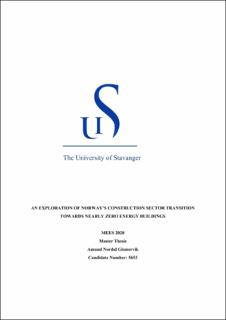| dc.description.abstract | This master thesis explores Nearly Zero Energy Buildings (nZEBs), with a special focus on Rogaland, Norway, looking at if - and how - the transition to nZEBs is unfolding. This research was inspired by the publication of the Energy Performance of Buildings Directive (EPBD) which is a mandate requiring new buildings in the European Union (EU) to be nZEBs by 2021. It was initially published by the European Parliament in 2002, and then recast in 2010 and 2018. Although not a member of the EU, Norway is part of the European Economic Area (EEA) and generally follows the EU’s climate policies. The Norwegian Parliament has announced that new buildings are to have nearly zero energy levels by 2020, and a modified Norwegian definition of nZEBs is being developed by the Directorate of Building Acts and Regulations (DiBK), but it has not yet been published. This thesis aims to shed light on how local construction companies in Norway and the Rogaland region are perceiving the concept of nZEBs, and to what degree adoption of new practices are starting to take place. In sum, research for this thesis discovered that since nZEBs regulations have not yet been published, construction companies are generally not explicitly preparing for a transition towards nearly zero energy buildings. However, efforts are being made to make the construction sector more sustainable.
The European Union’s definition of nZEBs specifies that the low energy requirements should be met to a large degree from renewable energy generated on site or closeby. Solar energy fits these characteristics, but in the Norwegian context abundant hydropower and low electricity prices might influence the nZEB definition.
Through the analysis of discourse in this thesis, it became clear that the general attitude among construction industry leaders towards renewable energy is somewhat negative (with the exception of hydropower). Still, solar energy has large potential in Norway and is becoming less costly and more widespread. Norway exports electricity from hydropower to the European continent, and imports non-renewable power. Gross energy use in Norway is roughly 50% renewable, meaning that more renewable capacity is still needed in order to reach national and international climate goals. Phasing out use of fossil fuels in all sectors by 2050 is Norway’s goal, which implies increased electrification, and that the future will demand more renewable energy.
Another area this thesis explores is the niche of tiny houses. Tiny house construction is a growing industry that centers on the building of small homes that are inherently energy efficient due to their size. Building smaller homes frees up capital and time, and simultaneously decreases the environmental impact compared to larger houses. This thesis investigates attitudes towards tiny homes in Norway as part of the transition towards low energy, and environmentally friendly buildings.
In sum, through the discourse analysis, several key themes emerged from the interviews with construction industry representatives in Rogaland. Those themes include the acknowledgment that the new nZEB regulations may be complicated and difficult to implement, that all companies interviewed were making small steps towards energy efficiency, there is some resistance to change, that actors recommended incentives and subsidies for nZEB implementation, and recognition that the solar energy debate and niche market of tiny houses will continue on. Overall, a successful transition towards renewable energy and energy efficient technologies like Nearly Zero Energy Buildings is imperative in order to attain sustainable development. | en_US |
